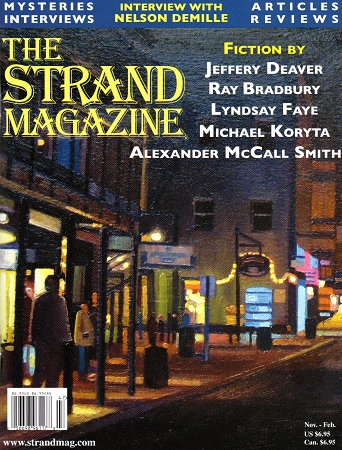Published for the first time ever in today’s issue of The Strand Magazine—the venerable publication that first brought Sherlock Holmes to the world—is perhaps the final lost story from the late Ray Bradbury. Among the endlessly appealing aspects of Bradbury; his insistence upon clinging to childhood at all costs remains perhaps his most consistent theme. Bradbury believed that “If you enjoy living, it is not difficult to keep the sense of wonder.” Further, he was delightfully immature about his interests, asserting “I have never listened to anyone who criticized my taste in space travel, sideshows or gorillas. When this occurs, I pack up my dinosaurs and leave the room.”
And in keeping with his desire to live in childhood perpetually, this new story “Dear Santa” brings us a young man who would like to be twelve forever.
Only about two pages long, “Dear Santa” showcases Bradbury’s unending talent for bottling up heartbreaking emotion in brief prose. No one ever accused Bradbury of being long-winded in his stories, at least not on the individual basis. Sure, when you look at his ridiculously prolific output, it might seem like this author was chatty as hell, but even his longest novels are short when compared to his contemporaries. (And by contemporaries, I mean literally everyone from Flannery O’Connor to Isaac Asimov, to some slick folks writing today.) Bradbury’s short fictions are like sleight-of-hand magic tricks, where once the trick is over, it’s time to move onto the next one. “Dear Santa” follows in these footsteps excellently, playing with our notions of what it means to be a child standing in line waiting for a shopping mall Santa Claus.
This particular young boy wants to be twelve years-old forever, which reminded me a little of the Harlan Ellison story “Jefty is Five.” (Having a lost Bradbury story remind you of Harlan Ellison is a little like having a Woody Allen movie remind you of Ingmar Bergman. The critical art brain doesn’t understand linear time!) But unlike “Jefty is Five,” where a young boy remains five his entire life, this young boy simple wants to be twelve for as long as possible, desperately whispering the desire under his breath. He’s sadly accosted by the mall Santa for seeming too old, and turns to the street, dejected, and a little too grown-up.
There, he encounters a tall, thin man who Bradbury describes as having “blue cheeks from shaving so close.” The boy seems to know this man, and specifically understand that this tall, thin stranger is the real Santa Claus, the magical entity walking around in plain sight. These jokers in the red suits and beards are just the front! The confidence with which the young boy asserts that he knows the man’s identity is nice. If the story were any longer, it would be too on-the-nose and overly sentimental, but because it’s so short, the Santa-as-a-thin-stranger conceit zings in and out of your brain quickly, like a magic trick.
I’m particularly fond of this sort Bradbury tale, not just because it serves up his usual brand of whimsical fantastical storytelling, but more importantly, because not everything is explained. In the pantheon of speculative fiction writers, we seldom think of Ray Bradbury when we think of excellent “world building.” (Save for maybe Fahrenheit 451.) But really, the mechanics of magic and science fiction are uninteresting to Bradbury, which is why, in theory, he shouldn’t appeal to hardcore SF readers. A story like this one, in the grand scheme of his work could easily be described as forgettable. And while I think it’s blasphemous to call any Bradbury “forgettable,” I can understand why a casual reader would say something like that. The story’s not long enough. Nothing really happens. And those complaints wouldn’t be unreasonable. But criticism like that misses the point; the essential point of Bradbury. It’s never about one story, it’s never about the one idea, it’s all about the magic show.
Good artists don’t create one piece of work, they create a body of work, a record of what they’re all about, the essence of what they’re trying to say. Each story (or painting or song or film!) is an attempt to distill that. Ray Bradbury got closer than most with nearly every single story. “Dear Santa,” isn’t his best story in any kind of top-ten all-time best Bradbury list. If he were the Beatles (and he very well damn near is the prose version) this story wouldn’t make it onto one of those greatest hits double-disc red and blue sets. This one is more like a “Honey Pie” or “Glass Onion.” The White Album needs those songs, otherwise its not the White Album.
And Ray Bradbury needs this funny little Santa Claus story. How else is going to remind us that he’s never going to go away? Even after passing, Bradbury is still a little kid. Forever and ever.
(This issue of The Strand is out now and also contains a story from Lyndsay Faye, a Tor.com contributor.)
Ryan Britt is a staff writer for Tor.com.










